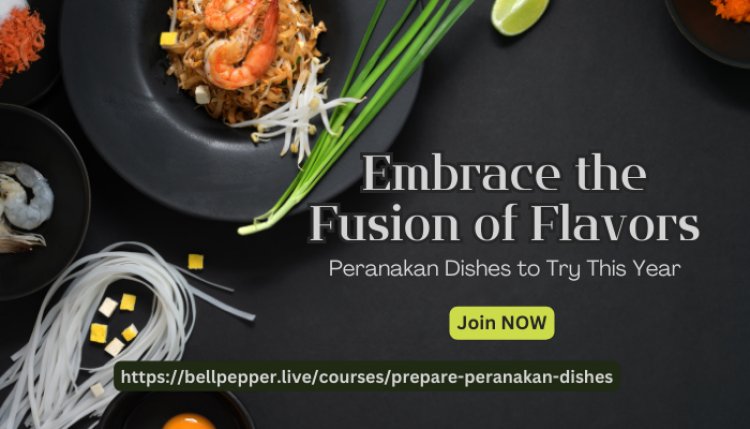Embrace the Fusion of Flavors: Peranakan Dishes to Try This Year
Discover the rich flavors of Peranakan cuisine with our guide to must-try dishes and cooking tips from Bellpepper Institute. Elevate your culinary skills today!
Share this Post to earn Money ( Upto ₹100 per 1000 Views )

Peranakan cuisine, also known as Nyonya cuisine, is a unique and tantalizing fusion of Chinese and Malay culinary traditions. The Bellpepper Institute invites you to explore the vibrant flavors and rich heritage of Peranakan dishes. This year, elevate your culinary repertoire by mastering the art of Peranakan cooking. Let's delve into some of the must-try Peranakan dishes that will tantalize your taste buds and leave a lasting impression on your culinary journey.
Understanding Peranakan Cuisine
A Rich Culinary Heritage
The Peranakan culture emerged from the intermarriage between Chinese immigrants and local Malays in the Malay Archipelago, particularly in Malaysia, Singapore, and Indonesia. This cultural blend gave rise to a unique culinary tradition characterized by bold flavors, intricate techniques, and the use of aromatic spices and herbs.
Key Ingredients and Techniques
To prepare Peranakan dishes, one must become familiar with essential ingredients such as lemongrass, galangal, turmeric, tamarind, coconut milk, and belacan (fermented shrimp paste). These ingredients are meticulously combined to create complex and harmonious flavors that are the hallmark of Peranakan cuisine.
Signature Peranakan Dishes
Ayam Buah Keluak
Ayam Buah Keluak is a quintessential Peranakan dish that exemplifies the fusion of Chinese and Malay flavors. This rich and savory chicken stew features the unique buah keluak nuts, which are soaked and painstakingly prepared to bring out their distinct earthy and slightly bitter taste. The dish is slow-cooked with a blend of spices, creating a luxurious and deeply flavorful experience.
Laksa Lemak
Laksa Lemak is a creamy and spicy coconut milk-based noodle soup that is a beloved comfort food in Peranakan cuisine. The broth is infused with a blend of spices, including lemongrass, turmeric, and chili, and is served with rice noodles, prawns, and hard-boiled eggs. Garnished with fresh herbs and a squeeze of lime, Laksa Lemak is a harmonious symphony of flavors and textures.
Nyonya Chap Chye
Nyonya Chap Chye is a delightful mixed vegetable stew that is both nutritious and delicious. This dish features an assortment of vegetables, including cabbage, carrots, mushrooms, and glass noodles, all simmered in a savory broth made from dried shrimp, garlic, and fermented bean paste. Nyonya Chap Chye is a versatile dish that can be enjoyed as a main course or a side dish.
Babi Pongteh
Babi Pongteh is a comforting and hearty pork stew that is slow-cooked to perfection. The pork is braised with fermented soybean paste, garlic, and shallots, resulting in tender and flavorful meat that melts in your mouth. This dish is often served with steamed rice and is a staple in Peranakan households.
Kueh Pie Tee
Kueh Pie Tee is a popular Peranakan snack that is both visually appealing and delicious. These bite-sized crispy pastry cups are filled with a savory mixture of julienned vegetables, shrimp, and a touch of sweet and tangy sauce. Kueh Pie Tee is often served as an appetizer and is perfect for entertaining guests.
Mastering Peranakan Cooking Techniques
Balancing Flavors
The art of preparing Peranakan dishes lies in achieving the perfect balance of flavors. Sweet, sour, salty, and spicy elements must harmonize to create a dish that is both complex and satisfying. Understanding how to balance these flavors is key to mastering Peranakan cuisine.
Pounding and Blending Spices
Peranakan cuisine relies heavily on the use of spice pastes, which are traditionally pounded by hand using a mortar and pestle. This labor-intensive process releases the essential oils and enhances the aroma and flavor of the spices. While modern appliances can be used, purists believe that hand-pounding yields superior results.
Slow Cooking for Depth of Flavor
Many Peranakan dishes are slow-cooked to allow the flavors to meld and develop fully. Patience is essential when preparing dishes like Ayam Buah Keluak and Babi Pongteh, as the slow cooking process ensures tender meat and a rich, flavorful sauce.
Exploring the Cultural Significance
Festive Occasions and Celebrations
Peranakan cuisine plays a vital role in festive occasions and celebrations. Dishes like Ayam Buah Keluak and Nyonya Chap Chye are often prepared for special events and family gatherings, symbolizing prosperity, unity, and cultural heritage.
Preserving Tradition
The Bellpepper Institute is dedicated to preserving and promoting Peranakan culinary traditions. By learning to prepare Peranakan dishes, you are not only exploring a rich culinary heritage but also contributing to the preservation of a unique and valuable cultural tradition.
Where to Experience Peranakan Cuisine
Cooking Classes and Workshops
The Bellpepper Institute offers comprehensive cooking classes and workshops where you can learn to prepare Peranakan dishes from experienced chefs. These hands-on sessions provide valuable insights into traditional techniques and allow you to recreate authentic Peranakan flavors in your own kitchen.
Restaurants and Food Tours
For those who prefer to savor the flavors of Peranakan cuisine without the cooking, numerous restaurants and food tours offer an immersive culinary experience. Explore the vibrant food scenes in Singapore, Malaysia, and Indonesia, where you can sample a wide variety of Peranakan dishes.
Conclusion
Peranakan cuisine is a delightful fusion of flavors and cultures that offers a unique and enriching culinary experience. By mastering the art of preparing Peranakan dishes, you can bring the vibrant and aromatic world of Peranakan cuisine into your home. The Bellpepper Institute is here to guide you on this culinary journey, offering the knowledge and skills you need to create authentic and delicious Peranakan dishes. Embrace the fusion of flavors and discover the magic of Peranakan cuisine today.

















